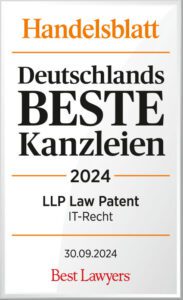Copyright attribution for stock photos

Stock photo agencies play a central role in the digital media landscape as they provide a wide range of high-quality images for various applications. These images range from marketing materials to editorial content. For content creators and companies, they offer a practical and cost-effective solution compared to traditional photographers. The legal aspects associated with the use of stock photos, particularly with regard to copyright, are of crucial importance. A recent judgement by the Higher Regional Court of Frankfurt sheds light on an important aspect of copyright law: the right to be named. This right, a manifestation of the author’s moral right, enables the author of a work to determine the form and design of their authorship designation. The court has now confirmed that a waiver of the right to be named as the author, provided it is provided for in the general terms and conditions, can be legally effective. More on this in the following article about copyright attribution for stock photos.
What are stock photos?
Stock photos are professionally taken photographs that are offered for sale or licence via stock photo agencies or online platforms.
They cover a wide range of topics. These include nature, people, business, cities, animals, events and much more. Stock photos are typically created by photographers who sell or post their work to these agencies. Customers can now purchase licences and use these images for their specific purposes.
The use of stock photos offers a cost-effective and practical solution for content creators, designers, advertisers and companies. Especially when they need high quality imagery but don’t want the cost and logistical hassle of customised photo orders. Stock photos can be used for a variety of applications. These include advertising materials, websites, publications, presentations and much more.
Right of attribution for stock photos
The right to be named is an essential component of moral rights, which allows the author of a work to decide on the indication and design of their copyright. There are no fixed legal requirements for the way in which the author’s name must be mentioned. It is up to the photographer to decide on the placement and form of the labelling.
If this right is not observed or implemented inappropriately, infringers risk legal consequences, including a warning letter. In such a situation, the author concerned has the option of asserting claims for damages and injunctive relief against further infringements.
Judgement of the OLG Frankfurt on stock photos
In a judgement dated 29 September 2022, the Higher Regional Court of Frankfurt (case reference: 11 U 95/21) confirmed that an agreement to waive copyright attribution in the general terms and conditions is possible.
In this case, a photographer had concluded an upload agreement with a microstock portal. This gave the portal rights of use to the images. This included the right to grant sub-licences to customers. A customer then used the photographer’s images on their website without naming the photographer. The photographer then sued for injunctive relief and damages. The claim was dismissed.
The decision
Photos can be protected by copyright, whereby the protection covers both the personal rights of the author and their exploitation rights.

An infringement of the exploitation right occurs if an image is distributed by third parties without the corresponding rights of use. If an image is used and the photographer is not named, the personal rights of the author are infringed. A waiver of attribution is only possible with a corresponding agreement.
The court found that the photographer had effectively waived his right to be named in the contract with the portal. According to the platform’s terms and conditions, the platform and its users have the right to name the photographer, but are not obliged to do so. This waiver was therefore valid, the court ruled. Photographers deliberately choose microstock portals to publish their work in order to reduce the effort and costs involved in marketing. The option of not having to name the author makes the offer more attractive for customers and promotes the distribution of the works. Ultimately, this also benefits the photographers. The court therefore did not consider this practice to be an unreasonable disadvantage for the author.

Conclusion: copyright attribution for stock photos
This decision emphasises the need to carefully examine the contractual agreements that come into play when licensing and using stock photos. Photographers and users of stock photos alike need to understand the importance of moral rights and the potential consequences of not complying with them.
In this context, it is important to realise that the decision to waive attribution should be carefully considered. In addition, you should always be familiar with the contract on the basis of which you grant others the right to use and exploit your photographs.
On the other hand, users of stock photos should always carefully check the licence agreements provided by the platforms. In some cases, there are differentiated offers from the platforms, which have different licence models and therefore also different requirements for naming the photographers, e.g. directly on the image or in the legal notice. There are often more expensive options that do not require attribution at all. There is no best practice in this area, so individual cases must always be examined.
We at LLP Law|Patent will be happy to advise you on the contractual structure of your business relationships. This will ensure that your interests are always protected.
Patricia Lotz | Rechtsanwältin (Lawyer)
Ms. Lotz focuses mainly on court proceedings. For over fourteen years, she has primarily represented industrial clients and SMEs in the IT and technology sector. She is also experienced in private construction law, employment law, commercial administrative law in disputes with trade offices amongst others and in the special case of “company audits and pseudo self-employment” in social law on behalf of companies.
Her primary goal is to avoid legal disputes wherever possible. However, if this is not possible or reasonable, she develops a suitable litigation strategy with her clients based on her many years of experience throughout Germany before civil, labor, administrative and social courts. Ms. Lotz also provides legal advice on employee invention law and foreign trade law, particularly on the export of dual-use goods.


